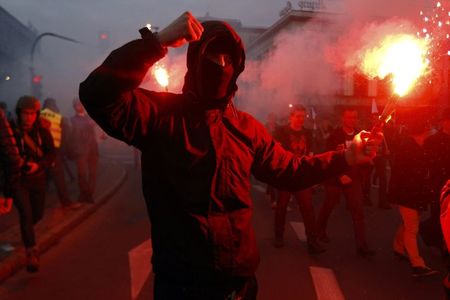By Adrian Krajewski
WARSAW (Reuters) - Police in the Polish capital used water cannon and fired rubber bullets into the air on Tuesday to push back several hundred masked men who broke away from a far-right march and threw stones and flares at lines of riot police.
Nationalist groups who believe traditional Polish values are under threat march through Warsaw each year to mark the anniversary of Polish independence, and for the fourth year in a row their procession turned violent.
When the march, involving tens of thousands of people, crossed a bridge over the Vistula river to the eastern bank near the national football stadium, a group of people broke away.
They tore up paving slabs and benches from a nearby bus station and hurled them at police, a Reuters reporter said.
The police responded by firing rubber bullet rounds into the air, and used jets of water, stained red by a colouring agent, from four water cannon trucks to push them back.
Three men tried to move forward using a large blue road sign they had torn down as a shield but were also driven back.
The Reuters reporter saw one man bleeding from a wound to his head and Polish television showed a police officer being stretchered into an ambulance.
Police spokesman Mariusz Sokolowski said more than 200 people had been detained, many of them before the march started for carrying items that could be used as weapons.
He said officers had contained the rioters in the area around the football stadium and were bringing the confrontation under control. The majority of the marchers carried on peacefully to a rally nearby.
Led by a centre-right government, Poland is enjoying a period of prosperity unprecedented in its modern history.
But some Poles feel traditional values - including a strong attachment to the Catholic church, and opposition to abortion and same-sex marriages - are being sacrificed as Poland embraces the ideals of the European Union.

At the start of the march, participants chanted "Down with the European Union!" One small group in the crowd, from the city of Chelm, began making Nazi-style salutes, but organisers intervened to stop them.
(Additional reporting by Anna Wlodarczak-Semczuk; Writing by Christian Lowe; Editing by Louise Ireland)
